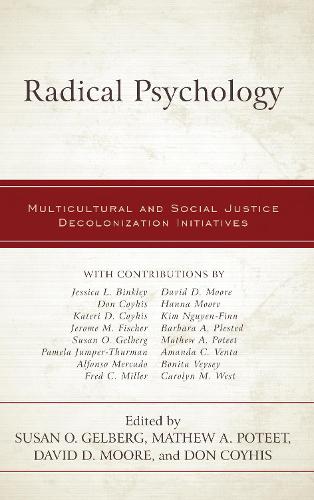
Radical Psychology: Multicultural and Social Justice Decolonization Initiatives
(Paperback)
Available Formats
Publishing Details
Radical Psychology: Multicultural and Social Justice Decolonization Initiatives
By (Author) Susan O. Gelberg
Edited by Mathew A. Poteet
Edited by David D. Moore
Edited by Don Coyhis
Contributions by Jessica L. Binkley
Contributions by Don Coyhis
Contributions by Kateri D. Coyhis
Contributions by Jerome M. Fischer
Contributions by Susan O. Gelberg
Contributions by Pamela Jumper-Thurman
Bloomsbury Publishing PLC
Lexington Books
6th July 2020
United States
Classifications
Professional and Scholarly
Non Fiction
Psychotherapy: counselling
Social work
616.8914
Physical Properties
Paperback
326
Width 154mm, Height 218mm, Spine 24mm
494g
Description
Radical Psychology outlines the psychological factors that shape multicultural competency and social justice effectiveness, such as implicit and explicit biases, difficulties in accurate self-assessment of cultural competency and social justice skills, and the historical biases that continue to shape Western psychological training and practice. This book provides a challenging balance between research and professional reflections in order to appeal to readers with different cultural backgrounds and learning styles. The diversity of the contributors underscores the need to include cultural experts as side-by-side colleagues, consultants, and supervisors in order to help Western psychologists expand their professional cultural paradigms and worldviews. This book is recommended for psychologists, counselors, educators, researchers, social workers, substance abuse counselors, administrators, students, and mental health agencies.
Reviews
In a remarkably timely volume, editors Gelberg, Poteet (both, Cross Cultural Counseling and Consulting, Inc.), Moore (Argosy Univ.), and Coyhis (White Bison, Inc.) explore the principles of social justice and decolonization and apply them to mainstream American psychology. The book offers suggestions for practitioners to "reduce the likelihood of the irrelevant or inappropriate imposition of Euro-American worldviews onto psychological research (p.viii). After an analysis of colonialism, its implications for bias, and harm done to marginalized groups, the contributors discuss implications and propose suggestions for decolonizing psychological practices. Topics range from an oral history of the Diagnostic and Statistical Manual of Mental Disorders and indigenous healing to treatment interventions for intimate partner violence of African American women and associated social justice issues for immigrants and Asian Americans. The volume ends with chapters concentrating on intersectionality, community healing, issues of identity, and decolonizing knowledge creation. A strength of the book is the varied nature of the expertise of its contributors, who range from academics to practitioners utilizing multicultural approaches. This book is recommended for anyone interested in decolonization initiatives.
Summing Up: Recommended. Most academic levels. * CHOICE *
Reading Radical Psychology: Multicultural and Social Justice Decolonization Initiatives fills me with both excitement and relief. In these racially traumatic times, all of us who claim to value justice must align our actual practice with our professed beliefs. The call is urgent. Here is our framework.
-Robin DiAngelo, PhD, Robin DiAngelo, LLC
-- Robin DiAngelo"Radical Psychology: Multicultural and Social Justice Decolonization Initiatives is a work that deals with social justice in the field of psychology in a practical and real manner which is long overdue. Issues like white fragility and privilege are addressed in a manner that is visceral and at the same time is intended to heal injustice. The authors have fulfilled Paolo Freires dream in that liberation discourse is about liberating the oppressed as well as the oppressor, and therefore an act of love." - Eduardo Duran, 7th Direction Psychotherapy, Assessment, and Consulting -- Eduardo Duran
Radical Psychology moves the conversation forward in multiculturalism and social justice in an approach that is accessible to mental health professionals as well as those in training. -- Joseph Chojnacki, Marshfield Medical Center
Author Bio
Susan O. Gelberg, PhD, is president and co-founder of Cross Cultural Counseling and Consulting, Inc.
Mathew A. Poteet is chief executive officer and co-founder of Cross Cultural Counseling and Consulting, Inc.
David D. Moore, PhD, EdD, is faculty member in the Graduate School Psychology Department at Argosy University.
Don Coyhis is president and founder of White Bison, Inc.
